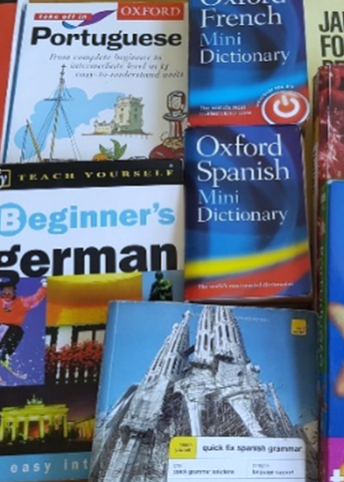The benefits of being bilingual
Bilingualism is defined as fluency in or use of two languages. Being bilingual, or even multilingual, has many health, social, and cultural benefits.

Cognitive Benefits
Bilingual learners often present better cognitive abilities, such as problem-solving skills, attention control, multitasking, switching between tasks and thus contributing to improved academic performance.
Language and Communication Skills
Language Skills:
Bilingualism can improve overall language skills, including a better understanding of grammar, vocabulary, and language structure in both languages.
Communication Skills:
Bilinguals are skilled at switching between languages, which enhances their ability to communicate effectively.
Literacy Skills:
Bilinguals may have an advantage in literacy and reading comprehension.
Career Opportunities
Many employers see language skills as highly desirable, especially in industries that require communication with a diverse range of clients, customers, and colleagues.
Cultural Awareness
Being bilingual involves exposure and integration to different cultures and traditions, an appreciation for diversity and fostering new relationships.
Personal and Health Benefits
Mastering another language can improve first language skills and thus increase self-confidence and personal satisfaction.
Bilingualism is associated with lower stress levels and better overall mental health. Some research suggests that bilingualism may contribute to a delay in the onset of dementia and age-related cognitive decline.

Fancy brushing up your own language skills?
North Tyneside Employment and Skills are offering free language courses for adults from this January onwards. They have courses in French, German, Italian, Spanish and British Sign Language.

Languages in our schools
The National Curriculum for languages is all about helping pupils get comfortable with a new language in a fun and engaging way. It focuses on making sure they can understand and respond to spoken and written language from real-life sources. Pupils are encouraged to speak more confidently and naturally over time, finding ways to express themselves, ask questions, and refine their pronunciation and intonation as they go. Writing is also a key part, with students learning to adapt their style and grammar to suit different purposes and audiences. Along the way, they’ll explore and enjoy a variety of written works in the language they’re studying. Most of our primary schools currently teach French or Spanish in their Modern Foreign Languages lessons, but any language can be covered in Key Stage 1 and 2 and Key Stage 3.
Organisations like Lingotot also offer classes and courses for children to improve their language skills, all around the country. Some of our North Tyneside schools make use of their local offer to enhance their language offering with lunchtime and after-school language classes for children.
Self-led learning
We now also have technology to help us learn languages. There are many great language learning apps and online courses that you can usually get started with for free.
Duolingo is a very popular choice and offers fun and varied ways to learn a large range of languages using games, reading, listening and writing exercises, as well as challenges and leaderboards to keep you interested.
Most language apps offer paid extras or enhancements, but give a free one a try to get started. If you'd like to find out more, this article looks at some of the best language learning apps for 2025.

Overall, being bilingual and studying languages opens a world of new, exciting opportunities for people and is important for a modern global economy.
Learning a second language is a valuable skill with numerous personal and professional benefits.
Article by
Zuzana Puente
English as an additional language Teaching Assistant
Ethnic Minority and Traveller Achievement Service
zuzana.puente@northtyneside.gov.uk

